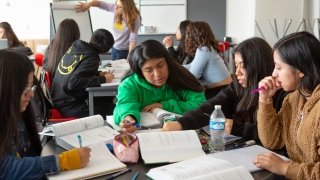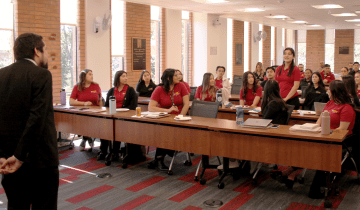Civics, social studies and history teachers face a challenge: How do they help their students explore important topics like human rights and gun violence in a politically charged environment?
USC Rossier researchers created the Democracy Project to help. After a year of development, including “learning exchanges” with teachers, school leaders and central administrative staff, the project is ready to pilot its first three curricula for high school students that align with requirements for the California Seal of Civic Engagement.
The Democracy Project is currently recruiting California civics teachers to teach the two-week modules and provide feedback.
We recently spoke with Robert Medrano EDL ’20, a 12th grade government teacher at Centennial High School within the Compton Unified School District and a project specialist for the USC Democracy Project about what teachers can expect from the pilot, and how it can benefit them and their students.
Why would a teacher be excited to participate in this pilot?
I’ll take a step back to our guiding light. There are challenges in U.S. democracy right now, and we can look no further than the houses of Congress to see political disagreements and the challenges with civil discourse. We have an urgent need to prepare these students to engage in civil discourse and participate in democracy at all levels. We’re grounded in this idea that we can get to more equitable outcomes in society if we have broader civic engagement. Our guiding light is from an education standpoint. How can we support the growth of these informed and engaged civic participants that are needed for a healthy and pluralistic democracy?
Our modules are structured into several stages. We’re calling it a deliberative inquiry. What it is really going to entail is that students research into topics that could be perceived as controversial topics. For example, gun violence. Students researching are going to statistics like CDC websites. They’re going to reputable sources, but they’re also encouraged to do open-ended research, which will have them consider the credibility of the resources that they’re coming across. Then there’s the deliberation guide that requires students to think more deeply about approaches to tackling controversial issues. Deliberation events offer multiple approaches, where they can brainstorm additional action for specific issues.
In the following phase, students start to come to ideas where they’re working in groups to address what to do next. They begin to brainstorm with informed action. We have a menu of civic actions where they’ll go through several rounds. Followed by reporting and answering questions like what did they learn and what impact did they make? Our hope is that they can see that civic engagement is possible. It’s not this nebulous experience. Students will understand it better by doing it rather than just reading about it.
Is this a year-long curriculum?
The curriculum consists of six modules that can be taught flexibly. Each topic should take about two to three weeks. We’ve designed a pathway where each lesson could be taught within a single class that could be a semester-long course. There’s also a student-centered option where students can conduct sustained inquiry in much shorter projects. If further constrained by time, however, we also have a deliberations pathway that offers deliberative experiences to explore multiple perspectives on how to address public issues. Realistically, we’re envisioning high school teachers using it to support their students to obtain the state seal, but not just for the sake of having a state seal. This recognizes students’ efforts to become informed civic participants.
You brought up difficult and challenging topics. How can teachers and this program address critical issues?
It’s a tough question–I wish I had a simple answer. This is challenging to teach. There’s plenty of research out there. Within the past year, a new report about teaching controversial topics in school was published by USC Dornsife and USC Rossier researchers. Our curriculum will provide guidance on how to support the discussion of those controversial issues. We also pulled topics from what teachers wanted to talk about in school. For those that are interested and are able to, I think that our curriculum can help because it provides concrete teacher ready-made materials that help students research, talk about and take action on these issues that are so sticky and troublesome. I understand that this is in the teacher-recruiting phase.
We’re aiming for 15 teachers. We have three pilot modules: human rights, police and safety and gun violence. We’ve drafted those materials in full, and we’re developing our last three: immigration, hate speech and climate change. Fingers crossed in the next couple of months. Those should be fully drafted. Once we get the pilot information and feedback, we’ll go through our revision process to strengthen it for use in classrooms across California and hopefully the country.
Teachers are preparing their students for upcoming exams. How do you relay the importance of this program?
If a teacher has an opportunity to try out one module, I think it would be worthwhile in the long term, when we’re looking at the State seal. Understandably, there’s a challenge of limited funded. There’s this other idea of readiness, where people are at different places. We recognize that, which is why we went modular. Even if you couldn’t fully use the curriculum, if you took one module or you allowed students choice for tackling different topics, that’s another way to do it in a short amount of time hypothetically. For those with students interested in talking about challenging issues, we want to cultivate that climate in the classroom to have those talks. We have deliberation lessons that can support that kind of tough conversation. How can we take informed action? I think just that [the Democracy Project] could be a starting place for some classrooms.




